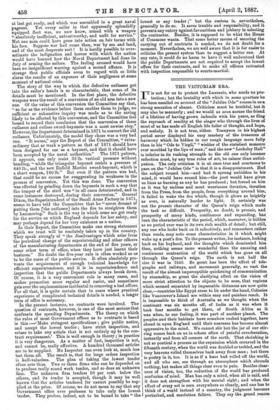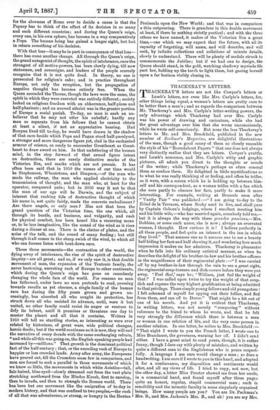THE VICTORIAN ERA.
TT is not for us to protect the Laureate, who needs no pro- tection; but the brutality with which in some quarters he has been assailed on account of the "Jubilee Ode" rouses in us a strong sensation of shame. Criticism must be truthful, but it may also be mannerly ; and we would as soon accuse the friend of a lifetime of having grown imbecile with his years, as fling the reproach of senility at the singer who through the lives of most of us has made all English life fuller of thought, and hope, and melody. It is not true, either. Tennyson in his highest period never displayed his easy mastery of the treasures of harmony which lie hidden in our rough language more fully than in his "Ode to Virgil," "wielder of the stateliest measure ever moulded by the lips of man ;" and the new "Locksley Hall" is inferior in its rushing strength to the old one only because reflection must, by any true rules of art, be calmer than antici- pation. The only criticism it is at once true and courteous to pass on the "Jubilee Ode" is that it is a disappointment. Had the subject roused him—and had it sprung unbidden in his mind, it would have roused him—the poet would have given us lines as burning as any he has produced ; but forced on him as it was by endless and most wearisome iteration, iteration from the Press, from the people, from everything around him, it failed to wake the fire which, though it glows as brightly as ever, is naturally harder to light. It certainly was not the prosaic character of the Queen's reign which made the task so difficult. Prosperity, no doubt, is prosaic, and prosperity of many kinds, continuous and expanding, has been the characteristic of the period, which, moreover, is hidden as no period ever was in its own rich wealth of detail ; but still, any one who looks back on it reflectively, and remembers rather than reads, may note some characteristics in it which might wake up a poet's fire. To the present writer, for instance, looking back on his boyhood, and the thoughts which dominated him then, nothing seems more wonderful than the amazing and continuous contraction of the world which has gone on all, through the Queen's reign. The earth is not hall the size it was in 1840. So great has been the effect of tele- graphs and railways, and movement generally, so vast the result of the almost imperceptible quickening of communication by steamship, so great the clarifying effect on the vision of more strict attention to the objects to be seen, that regions which seemed separated by impassable distances are now quite close,—countries like Egypt seem to lie under the hand, Colonies like Vancouver's Island are within easy and painless reach. It is impossible to think of Australia as we thought when the continent was six months off, of India as it was when it took four months to get there, of South Africa as it was when, to our feeling, it was part of another planet. The peoples and their habitats have somehow rushed together, have closed in upon England until their nearness has become almost oppressive to the mind. We cannot stir but the jar of our stir- ring comes back on us in echoes often of painful reverberation, instantly and from all corners of the earth. That shrinking is not so poetical a process as the expansion which occurred in the fifteenth century, when the world was doubled or trebled, and the very heavens rolled themselves back away from man ; but there is poetry in it, too. It is as if a haze had rolled off the world, and all who see, see through an atmosphere which shrouds nothing, but makes all things clear even to pain. Besides clear- ness of vision, too, the reduction of the world has produced confusion of mind. Man has only a mind, when all is said, and it does not strengthen with his mental sight ; and when the effect of every act is seen everywhere so clearly, and one has to think of a world instead of a country, the judgment becomes perturbed, and resolution falters. They say the grand reason
for the slowness of Rome ever to decide a cause is that the Papacy has to think of the effect of its decision in so many and such different countries ; and during the Queen's reign, every one, in his own sphere, has become in a way comparatively a Pope. The human being has gained a longer sight, but lost in return something of his decision.
With that loss—it may be in part in consequence of that loss— there has come another change. All through the Queen's reign, the grand antagonist of thought, the spirit of intolerance, once the strongest of all motive-powers, has been slowly dying, till now statesmen, and sovereigns, and leaders of the people scarcely recognise that it is not quite dead. In theory, no one is persecuted for religion's sake; and in practice throughout Europe, not only the reception, but the propagation of
negative thought has become entirely free. When the Qneen ascended the Throne, though the laws were the same, the spirit in which they were executed was entirely different ; society looked on religious freedom with an abhorrence, half-pious and half-pharisaic ; and an avowed atheist was in the greater portion of Europe a social pariah. To-day, no man is such an un- believer that he may not utter his unbelief; hardly any man so separate from his fellows that he cannot obtain at least a silent, if not an appreciative hearing. Had Banyan lived till to-day, he would have drawn in the shadow of that cave beside which Pope and Pagan stood half-paralysed, a stronger and more dangerous figure yet, clad in the enchanted armour of science, as ready to encounter Greatheart as Great- heart to draw sword on him. In that unfettering of the human mind, in the step forward of that armed figure intent on destruction, there are surely distinctive marks of the Victorian Era, and marks which are not prosaic. It has often been said that in 1950 the names of our time would be Stephenson, Wheatstone, and Simpson,—of the man who made the railway, the man who applied electricity to the transmission of thought, and the man who, at least for the operator, conquered pain ; but in 2050 may it not be that the man of our age will be Darwin, and the subject of interest that rushing tide of destructive thought of which his name is, not quite fairly, made the concrete embodiment ? Are there angels, or only men P Has not that been the grand question of the Victorian time, the one which, all through its bustle, and business, and vulgarity, and rush for physical comfort, has been heard like a recurring moan or, to be less imaginative, like the sound of the wind as it rises daring a dinner at sea. There is the clatter of plates, and the noise of the talk, and the sound of many feeding ; but still through it all comes in the sharp swish of the wind, to which all who can foresee listen with bent-down ears.
Those three movements—the contraction of the world, the dying away of intolerance, the rise of the spirit of destructive inquiry—are all great ; and so, if we only saw it, is that double movement of man, the expansion of the Teutonic family, the never hastening, unreeting rush of Europe to other continents, which during the Queen's reign has gone on ceaselessly changing the whole face of the world. For reasons no man has fathomed, under laws no man pretends to read, pressing towards results as yet obscure, a single family of the human race has during the fifty years grown and grown un- ceasingly, has absorbed all who sought its protection, has struck down all who resisted its advance, until, were it but united, no other family could resist its anger or venture to defy its behest, until it promises or threatens one day to master the planet and all that it contains. Writers in 1950 will tell us startling stories, as interesting as were ever related by historians, of great wars, wide political changes, heroin deeds; but if the world continues as it is now, they will end the narrative of every decade with the same unchanging refrain, and, while all this was going on, the English-speaking people had increased by—millions." That growth is the dominant political fact of the half-centnry ; that, or the unending rush of Europe to happier or less crowded lands. Army after army, the Europeans have poured oat, till the Crusaders seem few in comparison, and men are forced to seek a parallel in those movements of which we know so little, the movements in which white Asiatics—tall, fair-haired, blue-eyed—slowly streamed out from the vast plain stretching northward from the Hindoo Koosh, first to envelop, then to invade, and then to strangle the Roman world. There has been but one movement like the emigration of to-day in modern history, and that was confined to two peoples,—the rush of all that was adventurous, or strong, or hungry in the Iberian Peninsula upon the New World; and that was in comparison a thin outpouring. There is grandeur in this double movement at least, if there be nothing strictly poetical ; and with the three others we have named, it makes of the Victorian Era a great time,—one which we may expect that the future, with all its capacity of forgetting, will name, and will describe, and will seek, by infinite collections and collations of minute details, slowly to understand. There will be plenty of medals struck to commemorate the Jubilee; but if we had one to design, the Queen should stand, in the gold, watching shadowy myriads file past her, holding up the torch to light them, but gazing herself upon a far horizon visibly closing in.



































 Previous page
Previous page